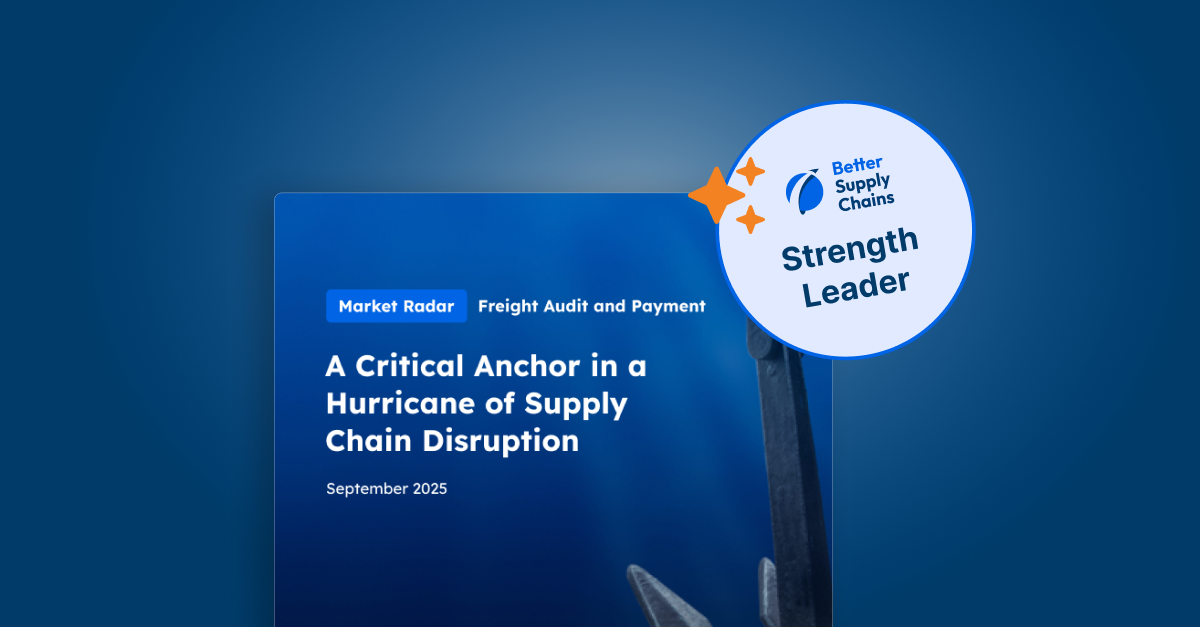A Parcel & Freight Shipping Invoice Auditing Guide: What to Expect

Shippers have a lot to focus on to ensure that they provide good customer service through timely, quality deliveries while reducing shipping spend. Meeting these goals takes strategic shipping optimization that carefully weighs customer experience with company needs and goals. While it's essential to optimize your shipping methods and processes, it should continue after the customer has received their goods.
At that point, you can further improve your shipping processes and overall business operations by performing a shipping audit regularly. These audits help your business save money and streamline and optimize shipping methods and processes.
What Is Parcel or Freight Shipping Invoice Auditing?
An audit of parcel or freight shipping invoices is a process that involves reviewing those invoices for mistakes or other problems, which tend to lead to unnecessary spend.
You may assume invoices should be correct and follow contracts, but in reality, as many as 80 percent of carrier invoices include discrepancies. Mistakes often occur in the busy shipping industry, including problems like duplicate payments, late deliveries, and incorrect information. Sometimes, the rates and fees on the invoice may not match what's in the contract.
Carrying out freight and parcel audits helps to catch problems like these and reduce them going forward.
Why Audit Freight and Shipping Invoices?
Auditing freight and shipping invoices brings significant benefits to a company.
- Savings Potential: Audits catch human errors, contract errors, and anomalous spending spikes that hurt the bottom line. You could be paying more than you should, and audits help you catch the mismatched spending and fix it.
- Deep Analysis: Collecting invoice data for audits and having a system of entering and tracking this data provides the ability to use all relevant data for deep analysis. The results can identify areas for improvement and drive informed decision-making throughout the company.
- Automation: It's especially beneficial to set up automation to create easier processing, reduce future mistakes, and better catch errors or unexpected fees in invoices. Some possible problems that can be caught and fixed going forward include incorrect shipper information, weights, mileage, and surcharges.
What Happens During a Parcel Shipping Invoice Audit?
If you have a small company with a limited number of contracts and invoices, you may think it's unnecessary to carry out invoice audits. But this isn't the case. Shipping audits are essential whether you send a few parcels here and there or have a steady stream of parcel shipments on a small scale. They can help you save money and recoup costs whenever mistakes happen, and consistent audits can also share data on your business and processes that can help you improve.
In parcel shipping auditing, you double-check the invoices from your carriers, which should be sent to you every week or biweekly. These invoices are long and complex, with many details, so it can be easier said than done to look through them, but having a process in place and software can help. The process of parcel shipping auditing should go through all data points found on the invoices to check for problems and ways to reduce shipping spend.
On a small scale, someone in-house can perform parcel audits manually, but better processes for carrying out consistent audits often help even small companies keep pace, grow, and scale. These could include dedicated staff members, data entry as invoices come in, technology, and potentially third-party auditors.
A parcel shipping invoice audit should include checking for late deliveries and whether your contract allows for refunds in those situations. This is often the case when carriers like UPS and FedEx deliver a package late when there was an agreed-upon shipping time frame.
During the parcel invoice process, your goal is to check for billing discrepancies like:
- Late deliveries
- Duplicate charges or invoices
- Incorrect information, such as weights or dimensions that do not match the package
- Unnecessary fees that shouldn't apply to that shipment
- Missing discounts that should be applied
- Non-shipments that were scanned but not sent
The successful parcel invoice audit process involves quickly finding these kinds of mistakes and submitting claims or refund requests within the carrier's designated time window for these requests. The carrier credits the difference to your parcel shipping account after confirming the mistake. This process can save you significant money on shipping, but it needs to be efficient and consistent to yield these benefits.
What Happens During a Freight Invoice Audit?
A freight invoice audit happens on a larger scale when medium to large businesses carry out large and consistent shipments of materials or goods. Audits of invoices are absolutely essential at this stage of business and can account for significant financial benefits and help shippers to streamline processes and operations.
What Is a Freight Invoice Audit?
A freight invoice audit is similar to a parcel invoice audit. You check the invoices for errors and compare them to the relevant contracts. The goals are to find and fix problems with the invoices, as well as to notice trends that help improve future processes and operations.
Freight invoice auditing is similar to parcel auditing, yet reviewing freight invoices is much more complex. Parcel invoices are problematic on their own, yet freight invoices go to another level of complexity. There are different rules governing freight invoice audits, and the contracts and invoices can also be related to more extensive shipments than small parcel shipments.
It is worth carrying out consistent freight invoice audits, as this process creates immense cost savings. While it may seem like a lot of work, it should be part of accounting processes that can ensure your company is paying the right amount for shipping, which makes up a large part of the overall financial picture for a shipper. This approach provides a straightforward way to tighten spending in your business and yields analytics and insights highlighting ways your company can become even more efficient and improve overall.
Factors that Impact Pricing
One area where it can be challenging to find discrepancies in freight auditing is the fuel cost, as this has been abnormally shifting from one invoice to the next simply due to global fuel pricing. It's helpful to be aware of these fluctuations.
In addition, freight shipping inherently comes with many freight fees called accessorial fees. An audit after the fact helps you better understand these fees and how they play out. You can notice whether the fees were correctly applied and learn how to include them in future contract negotiations. You may consider switching carriers or other factors based on these accessorial fees. Some of the main accessorial fees you're likely to encounter are the following:
- Home delivery
- Layover
- Storage
- Re-delivery when the carrier did not cause the problem
- Re-consignment
- Hazardous material shipping
- Driver loading/unloading
- Driver sorting and segregating
- Vehicle order not used (VONU)
Another complication of freight shipping is that large-scale shipping often involves working with a network of carriers and a range of services. Your audit needs to go through the many carrier contracts and shipment invoices, sorting through a significant amount of data that falls under different guidelines and pricing.
The Process
A freight audit generally requires dedicated people who are not trying to manage this process in addition to a lot of other work, which leads to mistakes and missed opportunities. You can have an in-house team that performs audits regularly, ideally with freight audit software that makes the process more efficient. Another option is to utilize a third-party partner to conduct audits and help with the claims process, allowing your staff to focus on what they do best.
Here is a process to follow:
1. Collect the invoices and enter data as the invoices come in.
2. Follow a freight invoice audit of:
- Looking for errors on the invoices
- Determining whether the contract was followed properly
- Checking for inefficiencies in the supply chain and shipping process to find areas for improvement
Some of the discrepancies to look for are:
- Duplicate invoices
- Accessorial fees
- Mismatched classifications
- Incorrect information, such as mileage amount
- Incorrect rates
- Calculation errors
- Missing discounts
3. Carry out claims processes related to the specific problem.
How to Process Millions of Freight & Parcel Invoice Audits with Precision
Whether shipping in your business is small-scale, large-scale, or somewhere in between, shipping audits are necessary. They also come with downsides, as they are complex, time-consuming, tedious, and can take away from other work. That doesn't mean you should avoid them; you need a solid process for efficiently carrying them out.
As mentioned, technology supports an efficient and effective auditing process, especially when shipping thousands or millions of invoices simultaneously. Intelligent Audit's Freight Audit and Recovery software solution carries out auditing processes for you, as it provides a contractual audit of more than 150 data points and allows you to automate audit processes like identifying discrepancies, submitting claims, and carrying out recovery.
Our machine learning technology can continuously carry out anomaly detection on its own, alerting you to problems much faster and better than team members can do. It can run through significant amounts of data across different shipping systems, including a TMS and OMS, to uncover invoicing errors and other problems. Machine learning can catch anomalous spending spikes that your company needs to address. The automation and efficiency of our proprietary machine-learning solution allow you to solve problems efficiently and within the claims window. It also provides visibility that can help you improve shipping processes.
Commit to an Effective Shipping Audit Process
Parcel shipping auditing and freight invoice auditing should become an integral part of your shipping and accounting processes. These audits should be more than an afterthought and should receive more focus than having someone only look at them when they get a chance.
Shipping invoices tend to be so complex and have so many mistakes that they create significant cost savings and streamline shipping processes. By checking for discrepancies and following insights from the data, these invoices include, you can take important steps forward for your business and your customers. Want expert, tech-driven parcel and freight invoice audits to catch any errors and anomalous spend spikes and get the insights you need to be a smarter shipper? Contact Intelligent Audit today to learn more.



